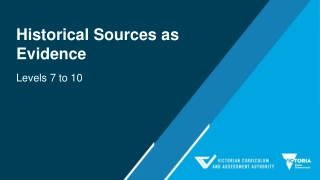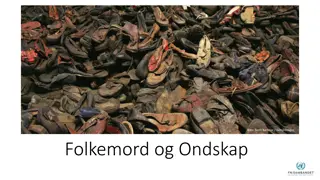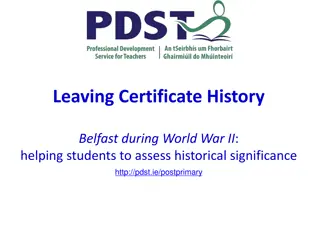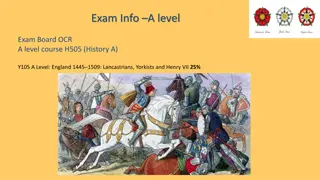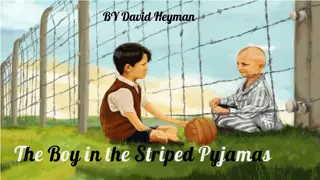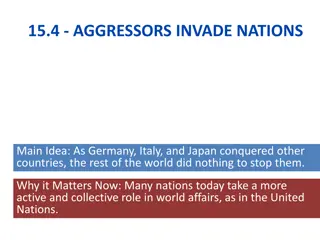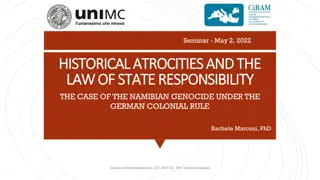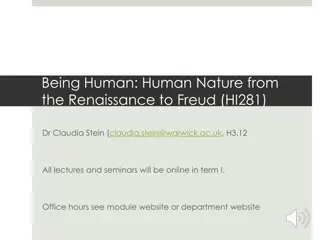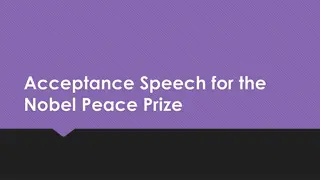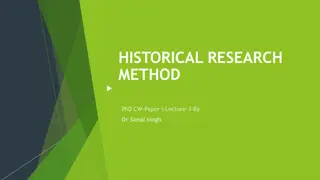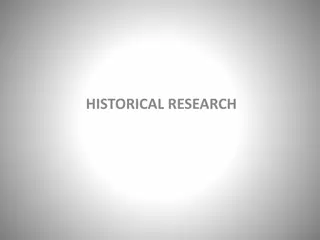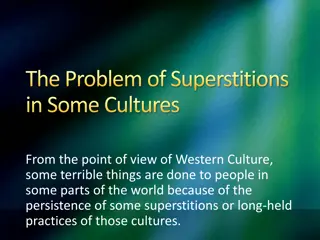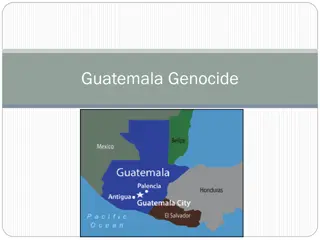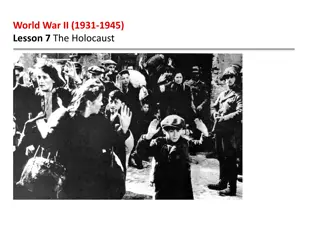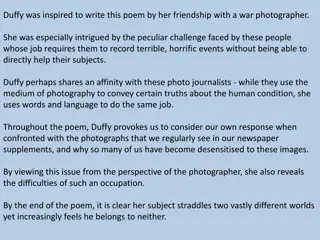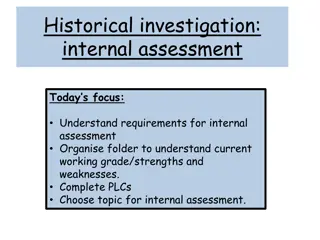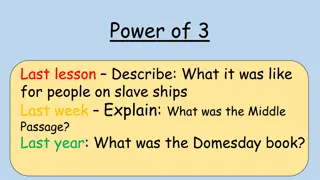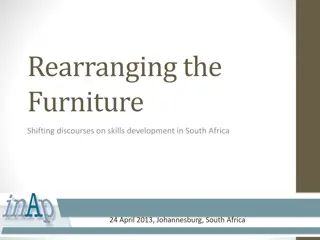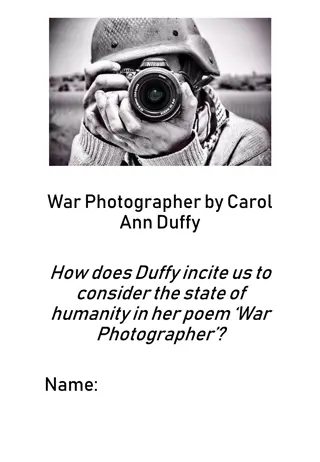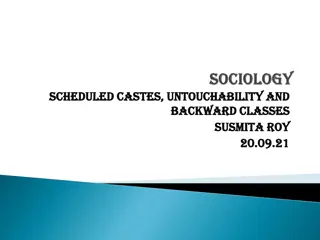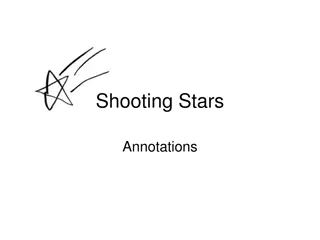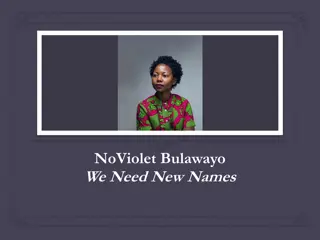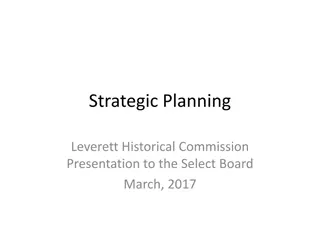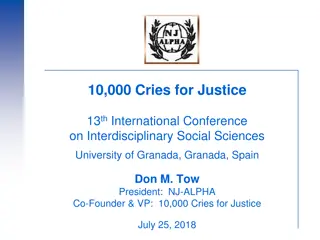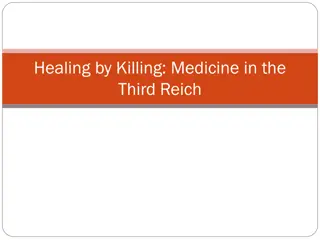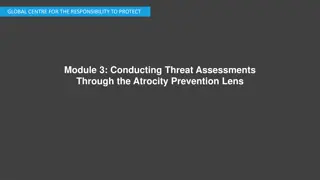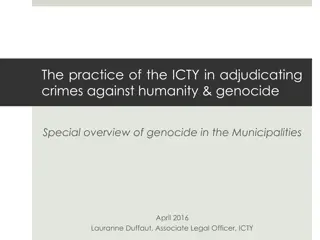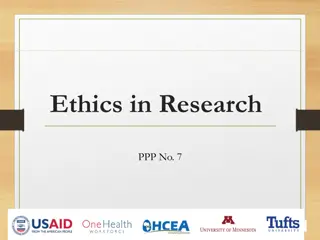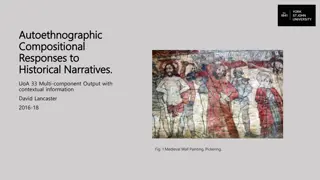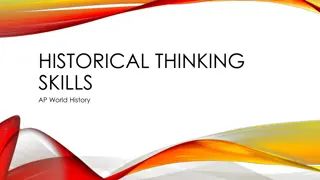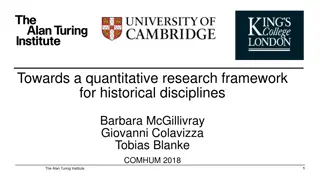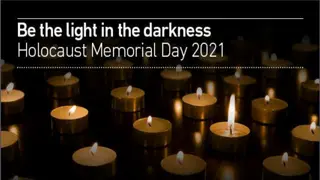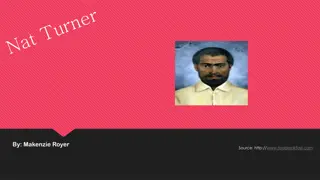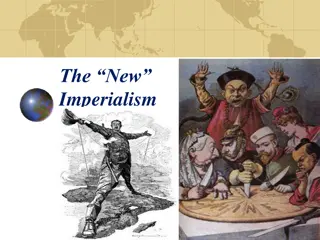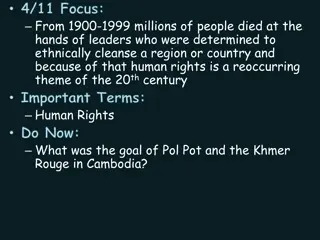Historical Sources as Evidence
Explore the importance of historical sources as evidence in the Victorian Curriculum History context, focusing on how students analyze, evaluate, and utilize sources to create historical explanations and arguments. Discover the significance of primary and secondary sources, perspectives of historica
1 views • 46 slides
Uncovering the Violent History of Capitalistic Enclosures
Explore the historical context of capitalist enclosures, their violent impacts on peasants, and the moral justifications used to conceal these atrocities. Delve into how economic narratives created moral bubbles to justify violent acts, as examined through the lens of Marx's analysis. Unveil the par
1 views • 11 slides
Understanding Genocide: Connection Between Ethnic Cleansing and Evil
Explore the concept of genocide, as defined by the UN, through historical events like the Armenian Genocide and the Holocaust. Delve into the depths of evil and its association with acts of genocide within societies, touching upon the banality of evil and the systematic eradication of entire groups.
2 views • 10 slides
Examining the Global Centre for Climate Change and Atrocity Prevention
The document presents a case for establishing a pilot scheme for the Global Centre for Climate Change and Atrocity Prevention by Dr. Ben L. Parr. It includes an introduction outlining the need for such an initiative, an examination of the Climate Change and Atrocity Prevention NGO universe, and disc
9 views • 12 slides
Challenges and Solutions in Implementing Historical Competencies in Teaching
Explore the complexities and obstacles faced in implementing historical competencies in teaching, as discussed by Jens Aage Poulsen, a senior lecturer and researcher at HistoryLab, University College Lillebaelt, Denmark. The content delves into competence-based curriculum, core historical competenci
0 views • 7 slides
Exploring Historical Significance of Belfast During World War II
Assisting students in assessing the historical significance of Belfast during World War II through an enquiry-focused approach. The content covers key aspects such as the impact of World War II on Belfast, its strategic importance, political leadership, the Belfast Blitz of 1941, and key terms relat
0 views • 32 slides
Wars of the Roses (1445-1461): Source Analysis on the Downfall of Henry VI
This content delves into the Wars of the Roses period (1445-1461) in England, focusing on the outbreak of conflicts, political turmoil, and the downfall of Henry VI. It includes an inquiry topic, sample paper question, and a detailed analysis of a historical source (Source A) by Jack Cade regarding
0 views • 16 slides
The Boy in the Striped Pyjamas: A Heart-Wrenching Tale of Friendship and Loss
The Boy in the Striped Pyjamas follows the story of Bruno, a German officer's son, who befriends a Jewish boy named Shmuel during World War II. Their friendship blossoms despite the barriers of a concentration camp, ultimately leading to a tragic end. The narrative delves into themes of innocence, f
0 views • 8 slides
Japan's Aggression in China: The Atrocities of Invasion
Japan's aggressive expansion in the 1930s led to the invasion of China, marked by incidents like the seizure of Manchuria and the brutal atrocities in Nanjing. The international community's failure to intervene effectively underscores the importance of collective action in global affairs, a lesson s
0 views • 24 slides
Historical Atrocities and State Responsibility: Namibian Genocide Seminar
Explore the legal analysis of the Namibian Genocide under German colonial rule, focusing on international responsibility and reparations. Delve into the historical background, negotiations, and the 2021 Joint Declaration between Germany and Namibia regarding the atrocities. Understand the events fro
1 views • 23 slides
Exploring the Evolution of Human Nature in Western Culture
Delve into the dynamic construction of human nature throughout history, from the Renaissance to modern times, questioning its transhistorical or relative essence. Discover how societal values shape our perceptions of human behavior and identity. Reflect on changing views of human nature in the face
0 views • 11 slides
Reflections on Elie Wiesel's Nobel Peace Prize Acceptance Speech
Elie Wiesel's Nobel Peace Prize acceptance speech raises thought-provoking questions about neutrality, solidarity, and freedom. Through powerful quotes, he emphasizes the importance of taking a stand against oppression and supporting victims to prevent atrocities. Wiesel's profound insights challeng
0 views • 4 slides
Understanding Historical Research Methods
Historical research is a systematic approach to investigating past events, developments, and experiences. It involves critical examination of evidence, interpretation of sources, and tracing of historical trends to gain insights into social changes. Various definitions by scholars like Kerlinger, Wh
1 views • 21 slides
Understanding Historical Research: Methods, Purposes, and Aims
Historical research involves investigating past events systematically to provide a dynamic explanation, interpretation, and understanding of the past. It aims to uncover unknown aspects, answer unexplored questions, and link past happenings to the present to enrich human culture and encourage interd
0 views • 20 slides
Cultural Challenges: Addressing Superstitions and Harmful Practices
Various cultures uphold long-standing superstitions and harmful practices, such as female infanticide and belief in witches, raising ethical dilemmas for Western observers. While understanding cultural contexts is crucial, confronting atrocities like children being accused of witchcraft necessitates
0 views • 23 slides
Genocide in Guatemala: Tragic History and Pursuit of Justice
The Guatemala genocide, perpetrated by military dictator Rios Montt, inflicted horrific atrocities on the indigenous Ixil Mayans from 1982 to 1983. Massacres, torture, and displacement marked this dark chapter. Despite international condemnation and legal actions, justice remains elusive.
0 views • 7 slides
Understanding the Horrors of the Holocaust in World War II
Explore the dark period of World War II with a focus on the Holocaust, tracing its roots, progression, and impact. Delve into Hitler's campaign against the Jews, his final solution, and the establishment of Nazi death camps. Learn about the devastating consequences of genocide, the United States' re
0 views • 18 slides
Exploring the Depths of a War Photographer's Psyche
A contemplative analysis of a poem inspired by the challenging role of war photographers, their struggle to document atrocities, and the impact on their mental state. Through structured stanzas and metaphorical imagery, the poet invites reflection on our response to such images and the photographer'
0 views • 36 slides
Requirements for Historical Investigation Internal Assessment
Understand the 25% weightage internal assessment comprising 3 sections for a historical investigation. Focus on source evaluation, investigation, and reflection within a 2,200-word limit. Choose a historical topic, analyze primary and secondary sources, and consider causation, consequence, continuit
0 views • 18 slides
Exposing the Horrors of the Middle Passage: A Journalist's Investigation
Investigate the deplorable conditions endured by slaves during the Middle Passage on slave ships in the 18th/19th century. Uncover the cramped, unhygienic, and brutal reality faced by enslaved individuals as they were forcibly transported from Africa to the New World. Analyze why such atrocities occ
0 views • 6 slides
Understanding Historical Context in Skills Development Discourses
Exploring the evolution of apprenticeship and skills development through historical sociology, historical futures, modes of justification, and complexity concepts. Emphasizing the importance of nuanced historical understanding to navigate contemporary challenges in South Africa's skills development
0 views • 29 slides
Insights into Genocide and War Crimes in the Former Yugoslavia
Explore the harrowing events surrounding the genocide in Srebrenica, as well as the ICC statute defining genocide. Witness the testimonies of individuals like Drazen Erdemovic and Dragan Obrenovic, shedding light on the atrocities committed during the Yugoslav Wars. Delve into the plea of guilty, re
0 views • 31 slides
Exploring Humanity Through "War Photographer" by Carol Ann Duffy
Carol Ann Duffy prompts readers to contemplate the grim realities of war and its impact on humanity through her poem "War Photographer." The poem delves into the isolated world of a photographer developing harrowing images captured in conflict zones, contrasting the peace of his darkroom with the ch
0 views • 4 slides
Understanding Scheduled Castes, Untouchability, and Backward Classes in India
The Scheduled Castes (SCs) and Scheduled Tribes (STs) in India are officially recognized groups, representing about 16.6% and 8.6% of the population respectively. They were historically known as Depressed Classes and have been given reservation status for political representation. The government has
0 views • 20 slides
Meaning Behind Shooting Stars: From Wishes to Tragedy
Exploring the dual significance of shooting stars - from being symbols of wishes and hope to representing the tragic fate of millions during the Holocaust. Analysis of Carol Ann Duffy's poem bringing to light the harrowing experiences of Jewish victims. The content dives into the profound themes of
0 views • 13 slides
The Legacy of Gukurahundi: Ndebele Particularism in Post-Crisis Zimbabwe
A campaign of terror known as Gukurahundi targeted the Ndebele people in Matabeleland, Zimbabwe, with over 20,000 civilians killed in the 1980s. This dark chapter continues to haunt the country as the Ndebele's experiences and history are marginalized by the dominant Shona narrative. Ndebele particu
0 views • 9 slides
Leverett Historical Commission Strategic Planning Presentation Overview
Leverett Historical Commission identifies issues with ad hoc requests, lack of clarity on historical property significance, and inadequate maintenance plans. A strategic plan is needed to define assets, determine significance, create guidelines, prioritize restoration efforts, and establish funding
0 views • 9 slides
Unveiling Historical Injustices: 10,000 Cries for Justice Conference
The 13th International Conference on Interdisciplinary Social Sciences at the University of Granada delves into the troubled history of WWII atrocities, focusing on Japan's unacknowledged crimes against humanity. From the horrors of vivisection on American POWs to the non-prosecution of Unit 731 lea
0 views • 11 slides
Medicine in Germany during the Third Reich (1933-1945): A Historical Study
Explore the dark history of medicine in Germany under the Third Reich, delving into topics such as eugenics, the T4 program, sterilization laws, and medical experiments. Uncover the atrocities committed in the name of healing and delve into the aftermath post-Holocaust, reflecting on the implication
0 views • 67 slides
Conducting Threat Assessments Through the Atrocity Prevention Lens
This module from the GLOBAL CENTRE FOR THE RESPONSIBILITY TO PROTECT focuses on conducting threat assessments through an atrocity prevention lens. It covers risk identification, situational awareness in field settings, information collection methods, addressing vulnerabilities of women and children,
0 views • 20 slides
Overview of ICTY's Adjudication of Crimes Against Humanity and Genocide
Explore the significant role of the International Criminal Tribunal for the former Yugoslavia (ICTY) in adjudicating crimes against humanity and genocide, focusing on the history, international crimes, specific trials, and achievements in bringing perpetrators to justice. The presentation provides i
0 views • 27 slides
Evolution of Ethics in Human Subjects Research
Human Subjects Research (HSR) or Human Subjects Use (HSU) plays a vital role in medical research, with a historical background and strict ethical guidelines in place. From past atrocities to contemporary practices, the use of human subjects has evolved, emphasizing the importance of informed consent
0 views • 26 slides
Exploring Historical Narratives through Music and Art
This submission presents two original compositions that delve into historical narratives through a unique blend of music and visual art. The compositions aim to reinterpret stories from the past, creating innovative structures and forms. By intertwining various perspectives and utilizing cinematic t
0 views • 8 slides
Historical Source Analysis Exam Questions Overview
The provided content outlines exam questions related to historical sources, guiding students on analyzing, evaluating, and interpreting information from different sources. The questions cover a range of topics such as learning from sources, assessing accuracy, understanding significance, and making
0 views • 12 slides
Developing Historical Thinking Skills in AP World History
AP History classes aim to cultivate apprentice historians by fostering historical thinking skills (HTS). These skills include Chronological Reasoning, Comparison and Contextualization, Crafting Historical Arguments, and Historical Interpretation. Each skill set equips students with the ability to an
0 views • 15 slides
Quantitative Research Framework for Historical Disciplines
Scholarly communities in historical disciplines are combining quantitative and qualitative methods to study phenomena that change over time. The proposed general methodological reflection aims to enhance research in historical linguistics through quantitatively driven models and claims. Quantitative
0 views • 18 slides
Remembering the Holocaust: Auschwitz Liberation and Holocaust Memorial Day
The 27th of January marks Holocaust Memorial Day, commemorating the liberation of Auschwitz by Russian soldiers. This day serves as a reminder of the atrocities of the Holocaust, where six million Jews were murdered by Hitler and the Nazis during World War II. The Holocaust Memorial Trust emphasizes
0 views • 11 slides
The Story of Nat Turner: From Childhood to Rebellion
Born in 1800, Nat Turner experienced a traumatic childhood marked by slavery and visions from God. Raised in a religious family, he had a deep-seated hatred for slavery. Turner's rebellion in 1831 led to the deaths of many, as he sought to overthrow the oppressive system. His army of 70 slaves wreak
0 views • 16 slides
The New Imperialism - Historical Overview of European Colonization
Explore the era of the New Imperialism through descriptions of North Africa, Egypt, Belgian Congo, and American missionary accounts. Learn about the impact of imperialism on various territories and the atrocities committed in the pursuit of resources and control.
0 views • 27 slides
Human Rights Abuses in the 20th Century: A Tragic Recap
Leaders in the 20th century, driven by ethnic cleansing agendas, inflicted mass atrocities resulting in millions of deaths. The theme of human rights violations prevailed, with incidents such as the Armenian Massacre, the Ukraine famine, the Holocaust, and the Rape of Nanking emblematic of the horro
0 views • 11 slides
